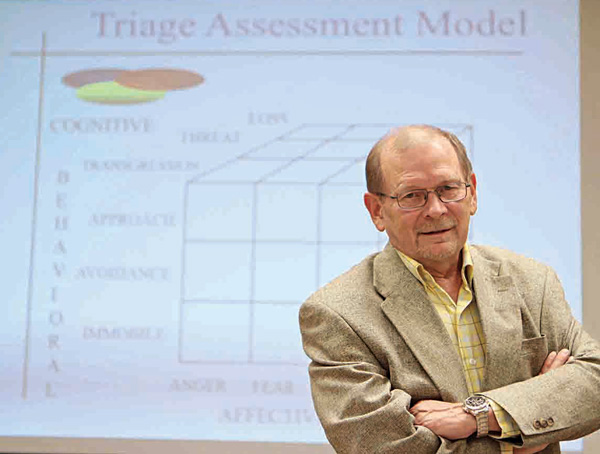Issue: Summer 2015 | Posted: June 8, 2015
Old School
Myer enhances crisis response in Turkey
The young woman on the videotape was distraught. Her face, framed by long dark hair, was etched with concern and her arms and legs quivered as she answered questions about how she and her family survived an earthquake in Turkey.
She occasionally grimaced and wrung her hands as she described the experience to another woman serving as a trauma therapist who calmly and softly asked questions while offering reassurance.
The dramatic scene was part of a 2014 summer workshop on crisis intervention at Atilum University in Ankara, a province in central Turkey. The woman was a student and the therapist was a faculty member. Off camera was Rick Myer ('73), chair of the University of Texas at El Paso Department of Educational Psychology and Special Services.
Myer, an international expert in his field, was invited by the Turkish Ministry of Science and Technology to participate in a five-week academic fellowship similar to the U.S. Fulbright Scholar program. He participated in research, workshops, panel discussions and classroom sessions tied to the psychosocial Triage Assessment Model that he helped develop in 1992 to assess an individual’s cognitive, affective and behavioral issues after a crisis.
Advanced instruction in crisis intervention and trauma therapy is valuable in Turkey, which experiences hundreds of earthquakes of different magnitudes annually and also shares borders with Syria, Iraq and Iran, which leaves it open to tens of thousands of refugees trying to escape social and political violence. The Turkish government is trying to enhance its methods to address emotional and psychological issues that impact its population and develop a stronger crisis management plan for its K-16 schools.
“My job was to do some training, but as a result we also collected data on the Triage Assessment Model form, and the analysis of that data shows that the information on the form is reliable in that culture,” Myer said.
The educator said he planned to coauthor several research papers with his Turkish peers using data from his summer work. They would use that data as the basis to resubmit a grant that would permit him to return to Turkey several times during a two-year period to do more extensive training in crisis intervention assessments and crisis management in other parts of the country and collect even more data.

